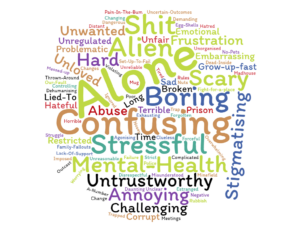26 Aug 21
Last week Coram Impact and Evaluation team published the independent baseline evaluation report from our New Belongings programme.
New Belongings is a three-year programme being delivered by Coram Voice. The programme works with eight local authorities in England, supporting them to engage care leavers in service improvements using a co-production approach. With funding from the Esmée Fairbairn Foundation and the Segelman Trust the programme began in July 2019 and will run until July 2022.
Using a range of tools such as the Baker and Dixon self-assessment for local authorities and the Your Life Beyond Care survey for care leavers, this evaluation report provides a baseline assessment of the starting point for the eight participating local authorities. 1,258 young people completed the survey mostly during March-May 2020.
These tools will be administered again in spring 2022, allowing pre- and post- data to be compared, which will enable the final evaluation report to describe any changes the New Belongings approach contributes to improving services for care leavers in participating local authorities.
The New Belongings baseline report gives us some interesting insight into how young people felt during the beginning of the pandemic and some a key message about their lives as care leavers.
- High levels of anxiety, loneliness, low life satisfaction and lack of close friendship were as common among care leavers during this period as before the pandemic, but did not increase.
- A higher proportion in our sample felt able to cope financially and reported lower levels of stress than a pre-pandemic group of care leavers.
- Access to the internet and being able to afford smart phones also increased.
The leaving care support in the local authorities involved in New Belongings had been assessed as good or outstanding in six of the eight local authorities, with the other two judged as requires improvement. The Baker-Dixon self-assessment mirrored Ofsted findings with those judged outstanding scoring themselves highest and those requiring improvement scoring themselves the lowest. Yet all the local authorities felt their services were ok or better. Despite this a significant proportion of care leavers in these local authorities were still struggling:
- 32% of them did not feel safe where they lived
- 29% felt unable to control the important things in their lives and
- 21% felt lonely often or always
The findings shows the need for continuous improvement in leaving care services with a renewed focus on the issues that care leavers report are important to them. It could also indicate that some of the additional support introduced during the first lockdown had a positive impact on care leavers lives.




